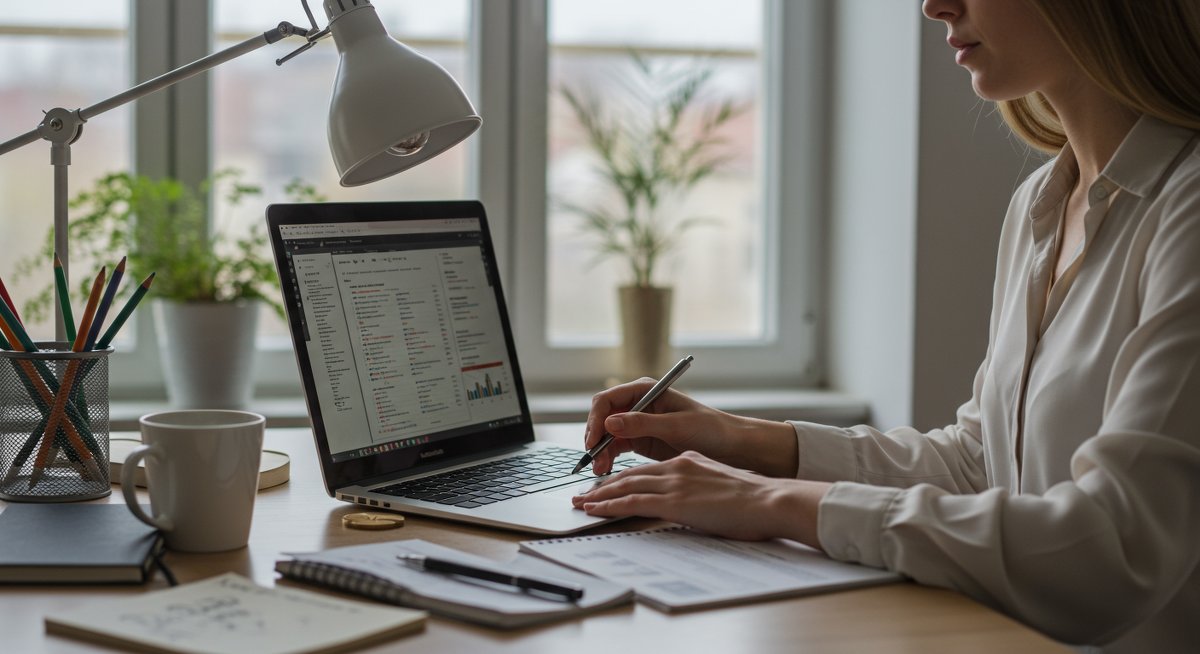
Why embracing budgeting matters for your nomad journey
So, you’re dreaming of the digital nomad life? Incredible! It's a path filled with adventure, freedom, and the chance to work from anywhere. But let's be honest, before you pack your bags and head to Bali, there’s one crucial thing to get sorted: your budget. I know, it might not be the most glamorous aspect of the nomad life, but trust me, mastering your finances is the key to unlocking true freedom and avoiding those late-night stress sessions about money. Budgeting isn't about restriction; it's about giving you control over where your money goes, ensuring you can travel longer, experience more, and worry less. This guide is designed for you, the aspiring digital nomad, who wants to build a sustainable and fulfilling life on the road. We'll cover everything from creating your first budget to uncovering those sneaky hidden costs that can derail your plans. Let's get you financially ready for your adventure!
Essential first steps to become a digital nomad
Before you even book your first flight, there are several essential steps to take to set yourself up for financial success. Ignoring these can lead to unnecessary stress and, potentially, an early end to your travels. First, understand your current financial situation. What’s your income? What are your existing debts? Create a clear picture of where you stand. Next, determine your income sources. Will you be freelancing, running an online business, or working remotely for a company? Each has different financial implications, particularly concerning taxes and legal requirements. Finally, set financial goals. What do you hope to achieve on your journey? More travel? Investing in your future? These goals will shape your budget and guide your decisions. It's also crucial to establish a separate bank account specifically for your travel and work expenses. This helps you keep track of income and spending, making budgeting much easier.
For example, Sarah, a freelance writer, started by listing her monthly income and debts. She then calculated how much she needed to earn to cover her basic expenses and save for travel. This allowed her to confidently set a financial goal: to save $5,000 in six months for her first trip to Southeast Asia. This proactive approach reduced her anxiety and gave her a clear path to achieving her travel dreams.
Here's another practical tip: Create a separate savings account specifically for unexpected expenses. Life on the road is unpredictable, and having a financial cushion will provide peace of mind if a health issue arises or if you need to book emergency travel.
Common beginner challenges & how to overcome them
Let's face it; the digital nomad life isn't always smooth sailing. Beginners often face several financial challenges that can be overwhelming if they're not prepared. One of the most common is fluctuating income. If you're freelancing or running your own business, income can vary from month to month. To overcome this, build a financial buffer by saving a portion of your income during high-earning months. A good rule of thumb is to save at least three months' worth of living expenses.
Another challenge is overspending. It's easy to get caught up in the excitement of traveling and blow your budget. To combat this, track your expenses diligently. Use budgeting apps, spreadsheets, or even a simple notebook. Knowing where your money goes is the first step to controlling it. You can also set daily or weekly spending limits and stick to them. Don't be afraid to adjust your budget as you go, learning from your mistakes. Furthermore, consider currency exchange fees. These can impact your budget. Use financial tools like Wise to minimize the impact of exchange rate fees and international transaction costs.
Consider the case of Mark, a web designer who initially underestimated his expenses. He struggled to manage his finances and almost ran out of money within three months. By implementing a detailed budget, tracking his expenses with an app, and cutting back on unnecessary costs, Mark regained control of his finances and extended his trip by another six months. This experience underscored the critical importance of proactive financial management in the digital nomad world. Another common mistake is underestimating the cost of accommodation. Booking monthly stays can often significantly reduce your accommodation expenses. When you are booking for shorter periods, always compare rates and look out for discounts.
Tips for success (e.g., budgeting, finding remote jobs)
Here are some actionable tips to help you succeed financially as a digital nomad. First, create a detailed budget. Start by listing all your fixed expenses, such as rent, insurance, and subscriptions. Then, estimate your variable costs, including food, transportation, and entertainment. Be realistic and allocate extra for unexpected expenses. Second, track your income and expenses. Use budgeting apps or spreadsheets to monitor where your money is going. This will help you identify areas where you can save. Third, set financial goals. What do you want to achieve with your money? Saving for a down payment on a house? Investing in your business? Knowing your goals will motivate you to stick to your budget. Fourth, learn to live frugally. Embrace the "buy less, experience more" philosophy. Consider cooking your own meals, taking advantage of free activities, and seeking out affordable accommodation.
Consider the story of Emily, a social media manager who was struggling to save. She started by using a budgeting app to track her expenses, which revealed she was spending a significant amount on dining out. By reducing her dining out expenses and cooking more of her meals, she was able to save over $500 per month. Furthermore, when you choose destinations, always factor in the cost of living. Some countries offer a significantly lower cost of living than others. Southeast Asia and Latin America, for instance, are generally more budget-friendly than Western Europe or North America. This allows you to stretch your savings further and experience more without breaking the bank.
Building a sustainable nomad lifestyle
Building a sustainable nomad lifestyle is about more than just saving money; it's about creating a long-term financial plan that supports your goals. Start by diversifying your income streams. Don't rely on just one source of income. Explore different ways to earn money, such as freelancing, creating and selling online courses, or investing. This provides a safety net if one income source dries up. Also, prioritize building an emergency fund. Life on the road is unpredictable, and having a financial cushion will provide peace of mind in case of unexpected expenses. Aim to have at least three to six months' worth of living expenses saved. Another key component of a sustainable lifestyle is investing in your future. Consider investing in stocks, bonds, or other assets to grow your wealth over time.
Take the example of John, a software developer. He consistently allocated a portion of his income to investments, gradually building up a portfolio that provided a steady stream of passive income. This financial discipline gave him the freedom to pursue his passions, travel more, and enjoy a comfortable lifestyle. Make sure you regularly review and adjust your budget. Financial situations change, so it's crucial to adapt your budget to reflect these changes. Adjust your spending habits to fit your needs, and don’t be afraid to make modifications to your plan.

Recommended resources for new nomads
Here are some valuable resources to help you kickstart your journey:
- Budgeting Apps:
- Mint: Mint is a free app that helps you track your expenses, set budgets, and monitor your financial goals. It's a great starting point for understanding where your money goes.
- YNAB (You Need A Budget): YNAB is a more comprehensive budgeting tool that uses a zero-based budgeting system. It helps you proactively manage your money and make every dollar count.
- Financial Planning Tools:
- Personal Capital: Personal Capital offers free financial tools to track your investments, plan for retirement, and analyze your net worth.
- For finding Remote Jobs:
- RemoteOK: A great resource for finding remote jobs.
- Travel Insurance:
- SafetyWing: SafetyWing offers affordable travel medical insurance designed for digital nomads.
- International Banking:
- Wise: If you want to avoid hefty fees, check out Wise for international money transfers.
Quick wins for your first nomad trip
Here are some quick wins to help you save money on your first trip:
- Choose your destination wisely: Research destinations with a lower cost of living. Southeast Asia and Latin America are often more budget-friendly than Europe or North America. Check out Nomad List for city data.
- Take advantage of free activities: Explore local parks, museums, and cultural events. Many cities offer free walking tours and other activities.
- Cook your own meals: Eating out can quickly eat into your budget. Cooking your own meals will save money.
- Use public transportation: Public transportation is generally cheaper than taxis or ride-sharing services. Consider purchasing a local transportation pass.
- Look for discounts: Take advantage of student discounts, senior discounts, and other deals. Always ask for discounts when available.
- Pack light: Avoid checked baggage fees by packing light. This can save you a significant amount of money on flights.
Next steps in your location independent life
Now that you’ve got a handle on the basics, what's next? The journey of a digital nomad is ongoing. Consider expanding your skills and finding new sources of income. The more versatile you are, the more financial security you will have. Start by exploring different ways to earn money, such as freelancing, creating and selling online courses, or investing. Also, explore tax implications. Don't forget to consult with a tax advisor to understand your tax obligations in different countries. And finally, invest in your financial education. Stay informed about personal finance trends and strategies. Consider taking online courses or reading books on budgeting, investing, and financial planning. By continuing to learn and adapt, you will create a more sustainable and fulfilling nomad lifestyle.